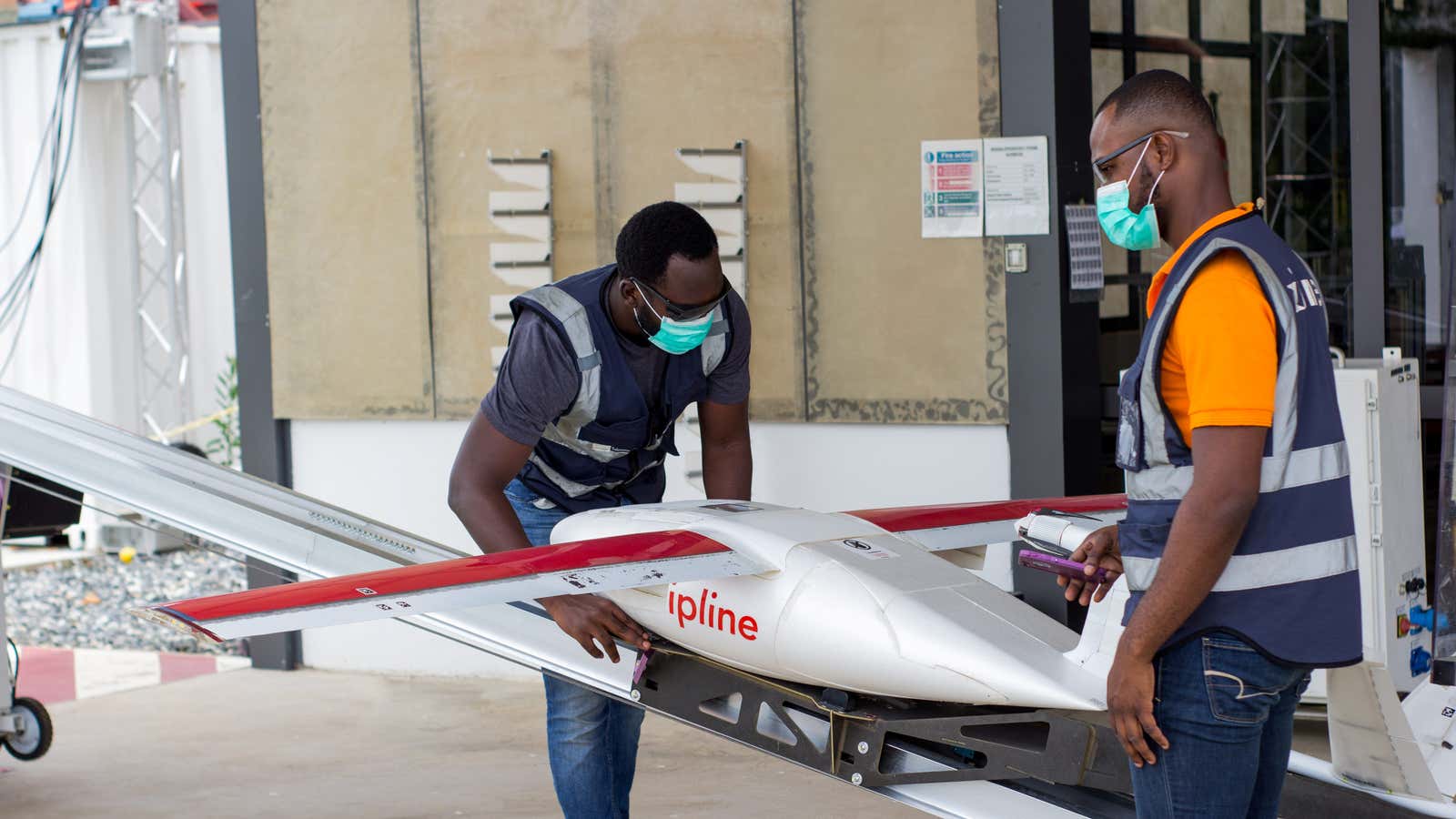In Oct. 2016, Zipline started delivering blood products to 21 Rwandan hospitals on-demand, reducing delivery time from four hours by road to within 20 minutes, using drones that travel up to 100 km per hour at a time.
The company has since added more medical products to its stock, including medicines and covid-19 vaccines, and has delivered packages to more than 2,000 hospitals across Rwanda, Ghana, and the US (where it is based.)
It marked its fifth anniversary last month by reaching 200,000 commercial deliveries, even as it says it serves 75% of the blood needs outside Kigali, Rwanda’s capital. These numbers suggest Zipline has nailed down an efficient model for a complicated task.
Confident in its business model and armed with fresh $250 million in funding, the company is jetting off to Nigeria, and Japan (in partnership with Toyota) for its next challenge. In Nigeria, it hopes to start operating in the northern state of Kaduna by early 2022, as the first step to serving the west African country where 30% of roads are paved (according to a 2017 estimate), and where a growing population’s health needs are underserved.
Where unique tech meets government partnership
On one hand, Zipline is a self-sufficient technology company that designs its drones and the software that powers them. The take-off and landing system is the product of meticulous attention to detail and works in wet and dry weather.
While Zipline is not the only company using drones for medical delivery in Africa, it uses miniature unmanned aircrafts, as opposed to the more energy-consuming and slower quadcopters used by LifeBank, the Nigeria-based blood delivery company (though LifeBank is able to pickup samples from hospitals while Zipline does not.)
The blood inventory part of Zipline’s work in Africa has been collaborative, involving governments, pharmacies, and other firms that deal in medical products. “We don’t build a parallel logistics system. We really integrate into what is already happening by identifying the greatest needs,” Israel Bimpe, a Zipline director for Africa, tells Quartz.
In Ghana for instance, the company has four distribution centers. Each receives health products from the country’s health ministry through medical stores designated for each region. The distribution centers are essentially centralized warehouses that operate round the clock and from which products are delivered to hospitals when they are needed.
This way, hospitals don’t have to stock more than they need at a time, preventing wastage of scarce blood products. A centralized source that responds quickly to hospital requests sent by WhatsApp, SMS, or phone call also solves for shortages.
Zipline hopes to replicate this structure in Nigeria, beginning with Kaduna. Nasir El-Rufai, the state’s governor, wants the company to kick off with three distribution centers that will have 30 drones each, delivering products to 1,000 health facilities that serve the state’s 1 million people. The company told Quartz it will look to launch in Cross River, a state in Nigeria’s Niger Delta area, after Kaduna.
Zipline could look beyond medical products
“Using a hub and spoke model (such as distribution centers,) drone operators are able to position strategically and improve physical access to reach a larger percentage of the population that may have otherwise been difficult to reach,” says Remi Adeseun, the director for Africa at Salient Advisory, a healthcare markets consultancy.
And contrary to fears that using sophisticated technology means higher healthcare costs, the efficiency of drone logistics can lead to cost savings, Adeseun says, by improving product visibility and traceability, making it easier to manage supply chains.
Getting into Nigeria could be big for Zipline’s larger ambitions as a logistics company that can move from just delivering medical products from government to health centers, to one that delivers other types of packages to consumers.
“Many people think we are a drone company—that’s how we get categorized. But we build logistics infrastructure to transform systems,” Bimpe says. On that note, Zipline’s entry into Nigeria could put it a step ahead of Amazon and UPS in the race to disrupt fulfilment in Africa.
But as in Rwanda and Ghana, Zipline will need to have good rapport with civil aviation authorities in Nigeria. Working directly with a state government to deliver healthcare could count in the company’s favor, though we may have to see what comes next for subsequent use cases.
Sign up to the Quartz Africa Weekly Brief here for news and analysis on African business, tech, and innovation in your inbox.
